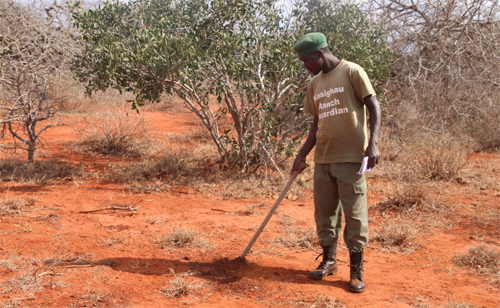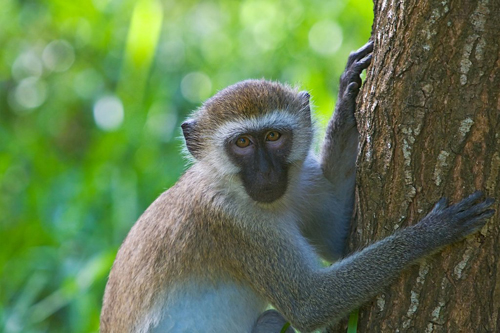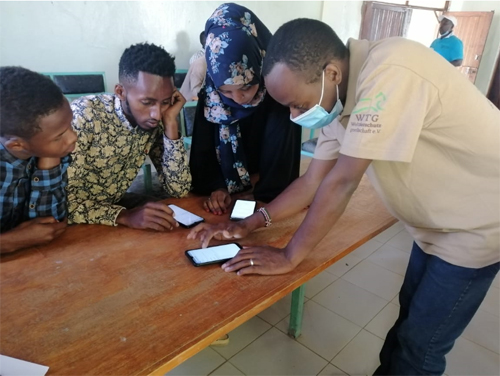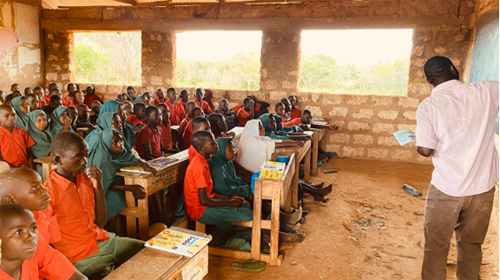Animal Welfare Updates - January 2021Kasighau Guardians Intensify Their Patrols Amid Rising Poaching Cases
During the month of January 2021, the ANAW supported Wildlife Guardians covered a total of 27 patrols within the expansive Kasighau ranch. The team spotted a total of 18 giraffes, 19 zebras, 20 elephants, 6 lesser kudus, 9 gerenuks, 34 impalas, 3 elands, 15 warthogs, 1 cheetah and 5 buffaloes. This month, the team focused most of their patrols at Mghongonyi in order to disrupt a group of illegal miners who had been camping around the area and some of them were also suspected to be poachers. Several incidences of bushmeat poaching were encountered: two incidences of apprehended poachers and three encounters of giraffe poaching. Through the intervention of the hawky wildlife guradians, four suspected poachers were arrested by the Kenya Wildife Service Rangers at the border of Kasighau and Maungu Ranch on January 6, 2021. On 14th January 2021, the Kasigau team laid an ambush and netted a motorbike carrying a panga, 5 dead gerenuks, 2 dikdiks and 1 impala near the Ranch’s Gate A. The suspects run away leaving their loot. ANAW has with the help of the Kasighau Wildlife Guardians continued to engage the communities neighboring the ranch with a view to creating awareness on the importance of preserving wildlife for our future heritage. Infant Sykes Monkey Rescued From A Dog Attack
The month of January 2021, Colobus Conservation – Primates Rescue and Rehabilitation Centre saw a total of 10 welfare cases attended to. Out of the 10, 6 were Sykes, 1 Baboon, 2 Colobus and 1 C. jacobinus bird. Out of these, 5 came in dead, 2 were euthanized, 1 was admitted to the orphan care program. Goodnews; an infant Sykes monkey was rescued from a vicious dog attack, and she was then entered into the orphan care program, too. ANAW continues to support the important work of conserving the primates by providing a resident Veterianarian Officer. ANAW-WTG Donkey Project Kicks Off
The implementation of the ANAW-WTG project that aims to address Cross-border Movement of Donkeys Across the East African Borders succesfully kicked off on January 9, 2021. The project focusses on Kenya-Ethiopia and Kenya-Tanzania border towns of Marsabit and Migori Counties. Some of the activities undertaken during this first phase of the project included;
Africa Conservation Education Fund (ACEF)
The sad story of bush meat is that unemployed youth have nowhere else to turn to for educational support and skills development. Africa Conservation Education Fund (ACEF) provides education scholarships to needy children and youth from the indigenous Watha community who neighbor Tsavo East National Park. The education fund is intended to support educational infrastructure development in local under-resourced schools and promote vocational training for out-of-school youth. It will provide needed educational resources for children from communities in wildlife areas by helping them access quality education, stay in school, complete their education, and overcome issues of poverty. Meet Pascal Mwachofi from Birikani village alongside Tsavo National Park whose dream has come true after receiving the much-needed educational support. Click Here to access the video: https://youtu.be/3G5tGELYGNA . (Alternatively, you can copy-paste the link onto your web browser). Africa Conservation Education Fund (ACEF) is a program of Africa Network for Animal Welfare that was established to raise funds for the education of children from the Watha community in the Tsavo East National Park ecosystem. Click here to donate: https://bit.ly/3tXXpK3 or follow this link to find out more about the programme: https://bit.ly/3qcX0Bj Support Our Work Here's a great way to support Africa Network for Animal Welfare (ANAW) and enable us to protect future generations of animals. You can do so through the following ways: Leave a Legacy in Your Will Through Donation Visit the https://www.anaw.org website for more information. |
||




